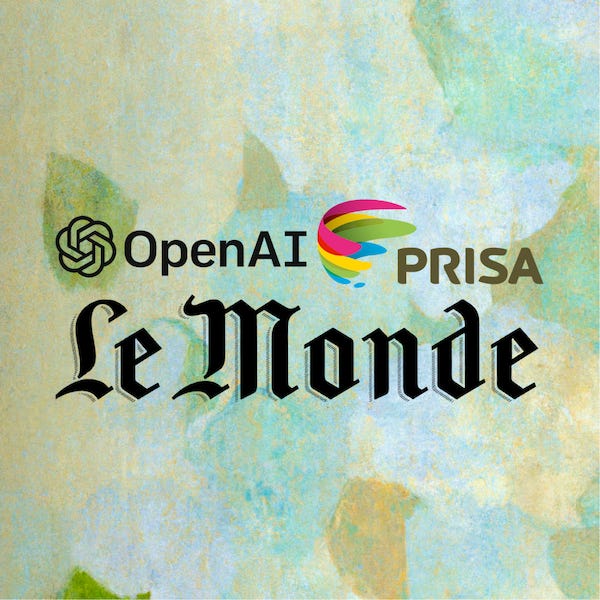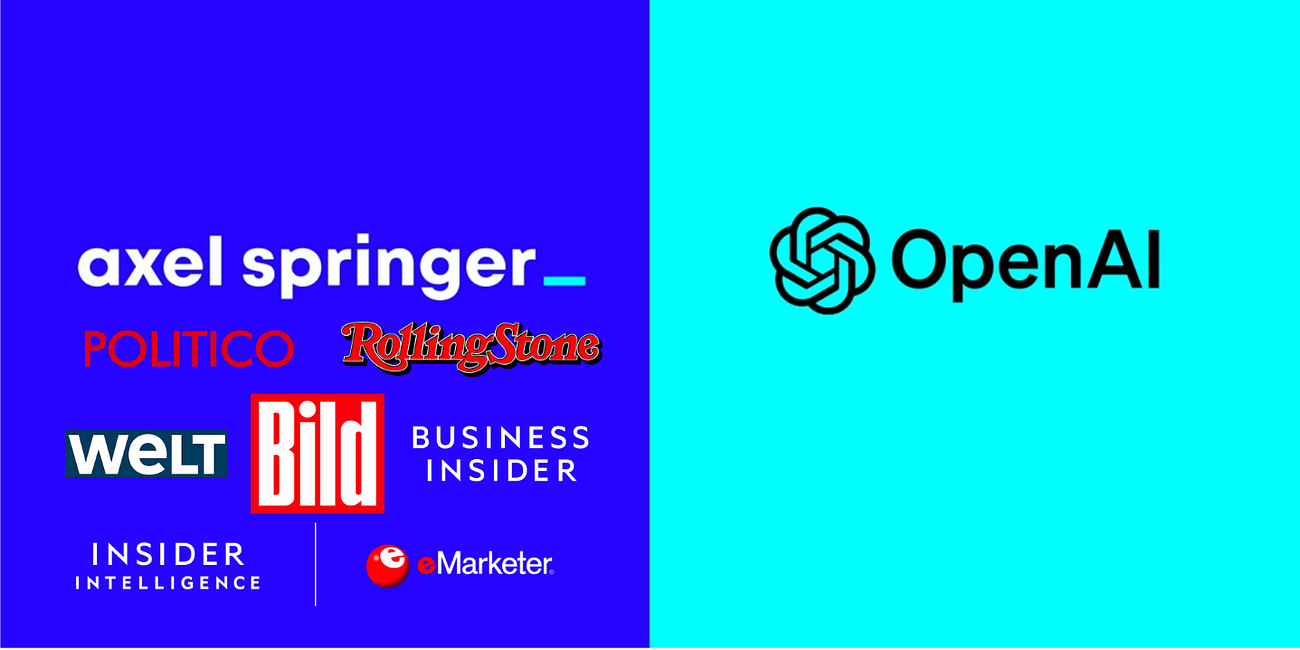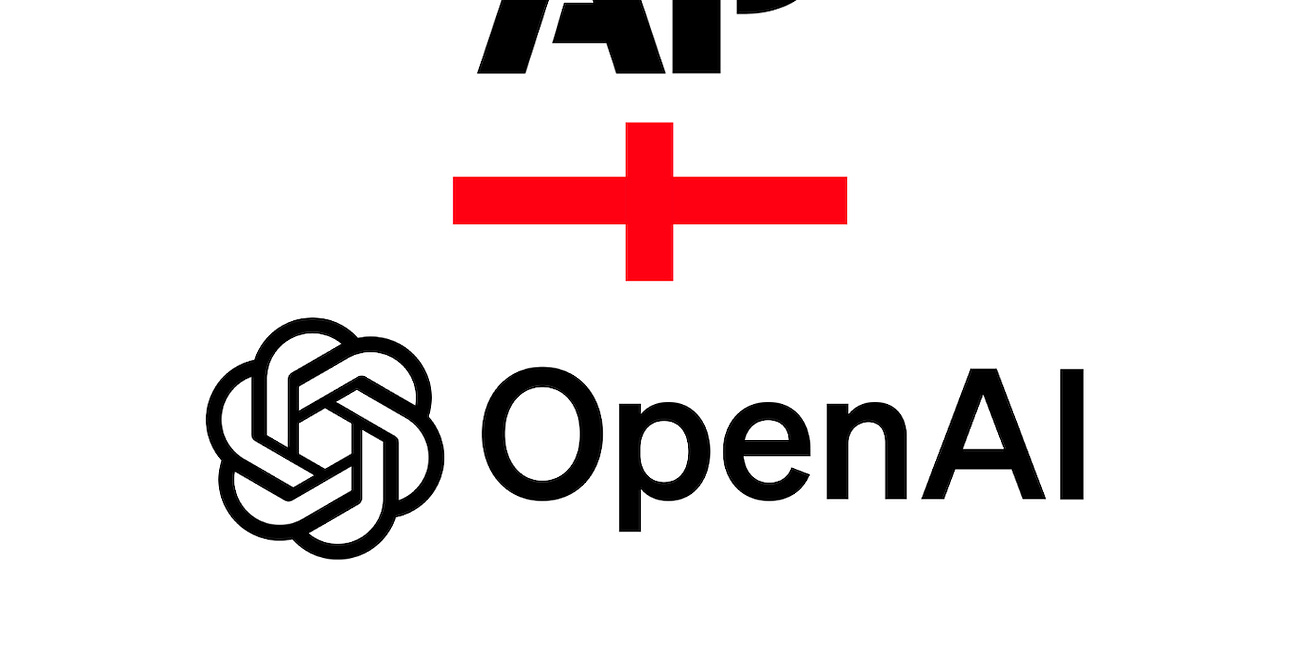OpenAI Adds News Partnerships in French and Spanish Through Le Monde and Prisa
Media organizations are lining up for licensing deals with the generative AI leader
OpenAI announced new partnership agreements with LeMonde and Parisa this week, which will provide ChatGPT users with in-depth French and Spanish-language news coverage. The media organizations also agreed to permit OpenAI to use their content to train future large language models (LLM). A blog post by OpenAI stated:
We are continually making improvements to ChatGPT and are supporting the essential role of the news industry in delivering real-time, authoritative information to users. We’re excited to announce partnerships with Le Monde and Prisa Media along with its publications like El País, Cinco Días, As, and El Huffpost. Our partnerships will enable ChatGPT users to engage with Le Monde and Prisa Media’s high-quality content on recent events in ChatGPT, and their content will also contribute to the training of our models.
News Media Partnerships and Acrimony
OpenAI has been accumulating news media partnerships since mid-2023. The company announced deals with the Associated Press in July and Axel Springer in December. The latter provides substantial content in German. Le Monde and Prisa will augment OpenAI’s access to rich language-specific data.
The technical race to improve foundation model performance initially focused on adding more parameters, rising from millions to billions to hundreds of billions to trillions. Over the past year, a trend emerged focused on growing the training dataset sizes from billions to trillions to tens of trillions of tokens (i.e., text-based information). More recently, OpenAI CEO Sam Altman has expressed the need for more quality in the training datasets. This is a big part of the reason behind recruiting news organizations as partners. Their highly curated news articles are the type of information that OpenAI can have confidence in without the need to review it closely.
The Information reported (N.B. paywall) in January that OpenAI was offering news organizations between $1 million to $5 million annually for access to their article catalogs. According to the article:
OpenAI is holding talks with as many as a dozen publishers, executives say, hoping to strike deals similar to those it has already done with Axel Springer, publisher of Politico and Business Insider, and the Associated Press. The owner of ChatGPT has concentrated most recently on negotiating deals with owners of global news publications rather than firms that publish other types of content on subjects such as entertainment and lifestyle, said one executive. Details of the Axel Springer and AP deals couldn’t be learned, but Axel Springer is receiving tens of millions of dollars over several years, according to industry executives. Axel Springer declined to comment and the AP didn't respond to a request for comment.
In addition, OpenAI is tying news media partnerships to future improvements in the ChatGPT user experience. Carlos Nuñez, Chairman and CEO of Prisa Media, commented in OpenAI’s announcement:
Joining forces with OpenAI opens new avenues for us to engage with our audience. Leveraging ChatGPT's capabilities allows us to present our in-depth, quality journalism in novel ways, reaching individuals who seek credible and independent content. This is a definite step towards the future of news, where technology and human expertise merge to enrich the reader's experience
It is unclear what those novel news experiences will be or how they will define the “future of news.” However, it is not hard to imagine ChatGPT using Prisa news content to answer questions and even proactively suggesting a reading list to users.
The New York Times has taken a more confrontational approach. It filed a lawsuit in December 2023 claiming that OpenAI had unlawfully used New York Times content to train the GPT family of LLMs, causing “billions of dollars in statutory and actual damages.” There is speculation that the lawsuit is a negotiating tactic the New York Times’ managers hope will result in higher annual licensing revenue from OpenAI.
The Best Deals May Be First
I expect to see more deals from OpenAI related to the news media, but there is an upper limit to what they will value beyond their initial partners. As I wrote in December 2023:
The New York Times … is by no means the only premium publisher available for partnership. Consider that The Washington Post and The Wall Street Journal provide coverage of many of the same stories as The Times, and you can see why OpenAI might not be eager to meet demands for large licensing fees…
OpenAI may very well cut a deal with The New York Times. It is already doing deals with other publishers. However, it is unlikely to cave to overzealous demands from The Times. The content just isn’t so differentiated that OpenAI must have it in the same way that Spotify needs deals with each of the three major record labels.
If Spotify were to fail to reach an agreement with Universal Music, Warner Music, or Sony, it would leave a big hole in their music library. Customers would notice. This isn’t the case for news. There may be a difference in quality, but not a gap in availability.
The first new media partnership in a particular language or domain specialty will provide more value to OpenAI than subsequent partnerships. This is because the company is getting access to something it previously did not have. Brand names matter less than the breadth and depth of content coverage if you are in the information commoditization business.
Axel Springer, Le Monde, and Prisa all took deals to extend their audience reach to the most popular generative AI assistant today. They also did it so they wouldn’t miss out on licensing deals altogether.
OpenAI and Microsoft Sued by New York Times for Copyright Infringement
That didn’t take long. Yesterday, we wrote about Anthropic’s new indemnity protection for users. That article concluded with the line: 2024 will be a year when generative AI goes to court. Earlier this morning, the New York Times filed a lawsuit naming OpenAI and Microsoft over the unauthorized use of copyrighted material to train large language models (L…
OpenAI Strikes ChatGPT Content Deal with Axel Springer, Publisher of Politico, Insider, and BILD
News publisher Axel Springer and OpenAI announced a content and technology partnership today that will bring information from Politico, Insider, BILD, WELT, eMarketer, Rolling Stone, and other publications to ChatGPT users. This includes articles normally behind a publisher paywall. The joint announcement from Axel Springer and OpenAI stated:
Associated Press Licenses its News Archive to OpenAI and will Begin Using LLMs
The Associated Press and OpenAI inked a deal last week to provide OpenAI access to the AP’s large library of news content. Some key AP stats will explain why OpenAI is particularly interested in partnering with the news syndicator: The AP published over 400,000 stories in 2022.









